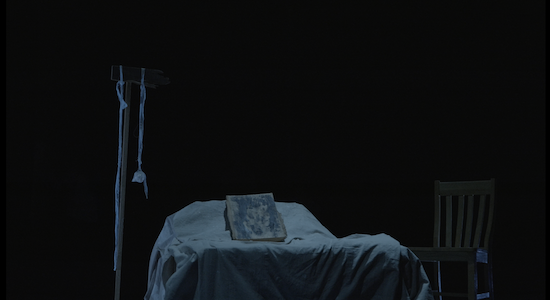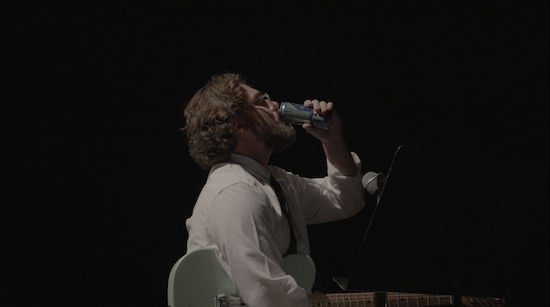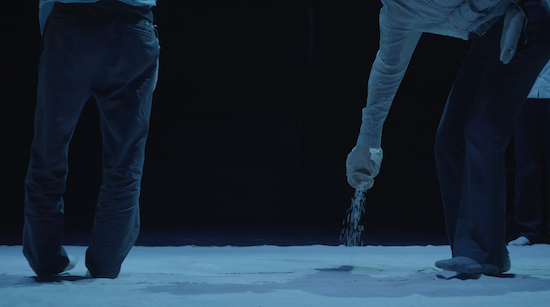
c/o Noah King
This review contains mentions of suicide, substance abuse, and terminal illnesses.
Last Wednesday, Feb. 5, 2025, I arrived at the Theater Studios in the Center for the Arts (CFA) around 7:45 p.m. to attend the open dress rehearsal for “When There is No Love to Give,” grateful to escape the bitterly cold night. By the time I entered the lobby, it was already packed with other students, some faculty members, and other supporters. While the wide variety of attendees was unlike any other invited dress rehearsal I’ve attended, it was ultimately unsurprising, as the show had been completely sold out for weeks before performances were set to begin.
The room buzzed with excitement about the show, a devised theater thesis performance conceived and directed by Noah King ’25. Flipping through the program as I waited for the show to begin, I was struck by the director’s note, candid and vulnerable in its articulation of King’s reasons for and process of creating “When There is No Love to Give.”
“To experience this amount of loss in such a short period of time has been extremely difficult,” King wrote. “However, being [at Wesleyan] has given me time to reflect on my loss, and how my work in theater…has helped me turn my grief into an in-depth conversation with myself and my peers. It’s almost cathartic.”
In a later interview with The Argus, King explained how he approached the show’s theme of grief through devised theater, a method of performance-making which engages the ensemble members through the sharing of ideas, prompts, criticisms, and performances.
“Devising, for me, was this way of applying my skills and experiences to a [process] of collaborative theater-making.” King said. “I designed roles for everyone, and I gave them the concept, which was grief. We created this performance about…how it affects people, how people think about it, and what it can cause people to do and feel.”
The performance began with a picture. As the crowd of theatergoers marched down the stairs into the theater itself, a photographer—who I’d later realize was the cast member portraying The Filmmaker (Jack Oshinsky ’27)—stopped each group or individual and took a quick snapshot of them before they completed their trek to their seats.
The set was minimally yet effectively dressed, consisting of huge wooden planks (roughly the size and shape of halved tree stumps) placed around the stage seemingly at random and a pair of raised platforms in the center of the stage. Each plank featured a touch of black paint; some of the spatterings were easily distinguishable as animals, objects, or the faces of people, while others simply looked like strokes of black paint. Pushed up against the back wall, King (who also portrayed The Musician) sat at a small station surrounded by instruments and equipment and strummed a sorrowful melody that immediately set the tone for the rest of the performance as I settled into my seat.
The music faded and The Artist (Lukas Shvetsov ’26) entered, cradling a plank of wood in his arms and scrubbing it intently with a drenched cloth. As the scene progressed, he became increasingly visibly frustrated with his progress, circling the room and intensifying the wiping motions. Soon, The Filmmaker joined him on stage, his camera capturing a live feed of the action that was projected on the wall above the music station. At the scene’s climax, Shvetsov ripped apart his t-shirt and climbed onto the central platform, alternately scrubbing the plank and his skin, as though to transfer some quality from his body to the artwork.

c/o Noah King
The second scene began with The Actor (Mia Ronn ’27) memorizing a monologue about grief. As she struggled to recall the lines and deliver them in a way she seemed satisfied with, she received a phone call which notified her of the passing of a loved one. After the call, she tried to return to rehearsing her monologue but was constantly startled by the jarring sounds of planks hitting the floor: King was pushing them over. The Actor paced around the room, increasingly upset by planks dropping as she bumped into them, and King played a high-pitched note—somewhere between a human wail and a car revving its engine—at fluctuating volumes. She tried to yell over it, but couldn’t overpower the piercing noise, until it finally stopped and she exited the stage.
As the scenery changed, a recording of a heated conversation between The Musician and The Writer (Nate Uberuaga ’25) blasted through the space. As the two debated the value of sharing one’s experiences with grief, King sat on the platform with his guitar in front of a standing microphone. He began to strum a playful tune and ad-lib lines by repeating his own words from the recorded conversation to the tune of his song. Once the recording ended, he launched into a Lonely Island-style song poking fun at himself and the show so far, eliciting chuckles from the audience with such lines as, “Do you guys think I’m a genius?” and “David Lynch would fucking love this.”
After an interlude in which he chugged an entire beer and performed a short stand-up routine about the death of a childhood pet, King ended the song and delivered a sobering monologue recounting the shiva of a close friend who committed suicide and his complex feelings during the mourning process. King later shared with The Argus that being honest about his personal experiences with grief was both nerve-wracking and a necessary component of creating “When There is No Love to Give.”
“I think what really helped me with putting out this work was that [Wesleyan] is an environment [where it’s safe to be vulnerable],” King said. “I [had to] sacrifice my privacy for the ability to connect with people, and I think that’s what made the performance stronger. The personal is the universal, and that’s what made people connect with it.”
In the scene following King’s monologue, The Dancer (Serena Murdoch ’25) and The Writer expressively move around the stage together, in a slow, sorrowful dance set to “Amazing Grace,” played by King on the clarinet. The dance began with both holding small vases filled with rice and pouring them onto the floor in fluid motions around the space. Once their vases were empty, they continued to move around one another, repeatedly leaning against each other as if they needed support but were unable to provide it for each other.
The penultimate scene was a monologue morosely delivered by The Filmmaker, as the pictures taken of the audience members flashed on the wall behind him. He contemplated the fleeting nature of life and the value of pictures and videos that capture specific moments in time.
“Grief is expanding, it swells and dissipates and repeats,” King wrote in the director’s note. “It’s the connection that is severed through the separation of living, of loving. Grief is when there is no love to give.”
After the stage was rearranged to resemble a hospital bed, King entered for the final time with his guitar and sang the haunting ballad “Blackbird” by Paul McCartney. While he sang to a block of wood on stage, it was clear that he was recreating the final moments he shared with the mother of a friend who lost her battle with cancer. I’m sure there was not a single dry eye in the house as his soulful voice echoed McCartney’s timeless lyrics.
“I’ll see you later,” he said to the absent person once the song was finished. A final piercing moment of grief filled the room as I realized that he never would.
King emphasized that each part of the performance would not have been possible without the show’s cast, as well as its creative and technical team.

c/o Noah King
“I’m grateful [to] the cast, Nina Kibria [’27], my project manager and Liz Laurence [’25], my [assistant director].” King said. “I hope that people will [leave] more inclined to think about theater in a much different way.”
Ultimately, “When There is No Love to Give” offered a reflective and honest look at how grief manifests in peoples’ lives in both predictable and unexpected ways, as well as how grief never really goes away once it shows up in your life. While the show approached its themes through the lens of King’s own experiences, the message that permeated each vignette was that grief, like death, is inevitable, but that we can all find ways to endure.
“This show [was] an interesting way of exploring my own insecurities [and] what people think of me as a creative [and] as a person,” King said. “[Seeing that] people really loved the show and connected with the work. It feels like they’ve connected with me.”
Post-thesis, King is directing Spike Tape’s production of “Macbeth” which will be performed in Alpha Delta Phi’s Greene Room on Friday, April 18 and Saturday, April 19, as well as co-directing Burlesque, which will hit the stage in Eclectic on Thursday, May 1, Friday, May 2, and Saturday, May 3.
Sulan Bailey can be reached at sabailey@wesleyan.edu.